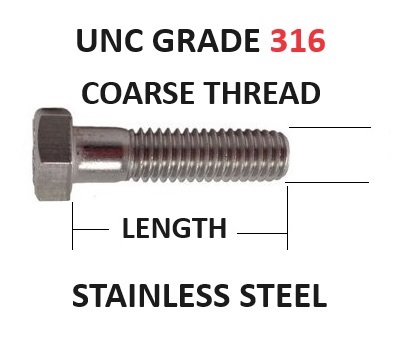Bolts Hex Head Imperial Unc And Unf Stainless Steel All Dimensions In Inches
UNC and UNF Bolts (ANSI B18.2.1) Stainless Steel
The Unified National Coarse (UNC) and Unified National Fine (UNF) bolts are standardized under ANSI B18.2.1, which specifies the dimensions and tolerances for inch-series hex cap screws, bolts, and studs.
UNC Bolts Stainless
Thread Profile**: UNC bolts feature a coarse thread profile with fewer threads per inch (TPI) compared to fine-thread counterparts. This design allows for quicker assembly, greater tolerance to thread damage, and better resistance to stripping in softer materials.
Applications**: Commonly used in construction and machinery where high strength and ease of assembly are required. The coarse threads provide a better grip in softer materials, such as aluminum or wood.
Dimensions**: For example, a 1/4-inch UNC bolt has 20 TPI, while a 1/2-inch UNC bolt has 13 TPI.
Strength**: The larger thread pitch results in a thicker and stronger thread root, providing higher shear strength.
UNF Bolts Stainless
Thread Profile**: UNF bolts have a fine thread profile with more threads per inch, resulting in a tighter, more precise fit. The fine threads allow for better torque tension and can be more securely tightened.
Applications**: Typically used in automotive, aerospace, and precision machinery where a tight fit and high strength are critical. Fine threads are ideal for hard materials where the risk of thread stripping is minimal.
Dimensions**: For instance, a 1/4-inch UNF bolt has 28 TPI, while a 1/2-inch UNF bolt has 20 TPI.
Strength**: Fine threads provide higher tensile strength and allow for finer adjustments and more secure fastening.
BSW Bolts (BS 1083) Stainless
British Standard Whitworth (BSW) bolts conform to BS 1083, which standardizes the dimensions and threads for Whitworth fasteners, primarily used in the UK and some Commonwealth countries.
BSW Bolts
Thread Profile**: BSW bolts feature a 55-degree thread angle with rounded crests and roots. This thread form was one of the first standardized thread forms and is characterized by its robustness and ease of production.
Applications**: Historically used in the manufacturing of heavy machinery and early automotive applications. Although largely replaced by metric threads in modern engineering, BSW bolts are still used in vintage machinery and restorations.
Dimensions**: The thread pitch varies with the diameter, such as a 1/4-inch BSW bolt having 20 TPI and a 1/2-inch BSW bolt having 12 TPI. The dimensions are different from UNC and UNF bolts, making them incompatible without adapters.
Strength**: The rounded thread profile reduces stress concentration, making BSW bolts less likely to fatigue under heavy loads. The coarse pitch also provides durability in softer materials.
Comparison and Usage
UNC vs. UNF Bolts**:
Speed and Efficiency**: UNC bolts are quicker to install and better suited for softer materials, while UNF bolts provide more precise adjustments and are suitable for harder materials.
Strength and Durability**: UNC bolts offer better resistance to stripping, whereas UNF bolts provide higher tensile strength and secure fastenings.
BSW Bolts**:
Historical and Specific Uses**: BSW bolts are predominantly used in older machinery or where British standards are required. They offer unique benefits in specific applications, such as restoration projects.
Overall**:
UNC and UNF bolts provide flexibility in modern engineering with their standardized dimensions and widespread availability.
BSW bolts, while less common today, continue to be relevant in specific niches, emphasizing their historical significance and durability in certain applications.
Understanding these standards and their appropriate applications ensures the selection of the right fastener for the job, contributing to the reliability and safety of the assembly.
UNC and UNF Bolts (ANSI B18.2.1) Stainless Steel
The Unified National Coarse (UNC) and Unified National Fine (UNF) bolts are standardized under ANSI B18.2.1, which specifies the dimensions and tolerances for inch-series hex cap screws, bolts, and studs.
UNC Bolts Stainless
Thread Profile**: UNC bolts feature a coarse thread profile with fewer threads per inch (TPI) compared to fine-thread counterparts. This design allows for quicker assembly, greater tolerance to thread damage, and better resistance to stripping in softer materials.
Applications**: Commonly used in construction and machinery where high strength and ease of assembly are required. The coarse threads provide a better grip in softer materials, such as aluminum or wood.
Dimensions**: For example, a 1/4-inch UNC bolt has 20 TPI, while a 1/2-inch UNC bolt has 13 TPI.
Strength**: The larger thread pitch results in a thicker and stronger thread root, providing higher shear strength.
UNF Bolts Stainless
Thread Profile**: UNF bolts have a fine thread profile with more threads per inch, resulting in a tighter, more precise fit. The fine threads allow for better torque tension and can be more securely tightened.
Applications**: Typically used in automotive, aerospace, and precision machinery where a tight fit and high strength are critical. Fine threads are ideal for hard materials where the risk of thread stripping is minimal.
Dimensions**: For instance, a 1/4-inch UNF bolt has 28 TPI, while a 1/2-inch UNF bolt has 20 TPI.
Strength**: Fine threads provide higher tensile strength and allow for finer adjustments and more secure fastening.
BSW Bolts (BS 1083) Stainless
British Standard Whitworth (BSW) bolts conform to BS 1083, which standardizes the dimensions and threads for Whitworth fasteners, primarily used in the UK and some Commonwealth countries.
BSW Bolts
Thread Profile**: BSW bolts feature a 55-degree thread angle with rounded crests and roots. This thread form was one of the first standardized thread forms and is characterized by its robustness and ease of production.
Applications**: Historically used in the manufacturing of heavy machinery and early automotive applications. Although largely replaced by metric threads in modern engineering, BSW bolts are still used in vintage machinery and restorations.
Dimensions**: The thread pitch varies with the diameter, such as a 1/4-inch BSW bolt having 20 TPI and a 1/2-inch BSW bolt having 12 TPI. The dimensions are different from UNC and UNF bolts, making them incompatible without adapters.
Strength**: The rounded thread profile reduces stress concentration, making BSW bolts less likely to fatigue under heavy loads. The coarse pitch also provides durability in softer materials.
Comparison and Usage
UNC vs. UNF Bolts**:
Speed and Efficiency**: UNC bolts are quicker to install and better suited for softer materials, while UNF bolts provide more precise adjustments and are suitable for harder materials.
Strength and Durability**: UNC bolts offer better resistance to stripping, whereas UNF bolts provide higher tensile strength and secure fastenings.
BSW Bolts**:
Historical and Specific Uses**: BSW bolts are predominantly used in older machinery or where British standards are required. They offer unique benefits in specific applications, such as restoration projects.
Overall**:
UNC and UNF bolts provide flexibility in modern engineering with their standardized dimensions and widespread availability.
BSW bolts, while less common today, continue to be relevant in specific niches, emphasizing their historical significance and durability in certain applications.
Understanding these standards and their appropriate applications ensures the selection of the right fastener for the job, contributing to the reliability and safety of the assembly.



